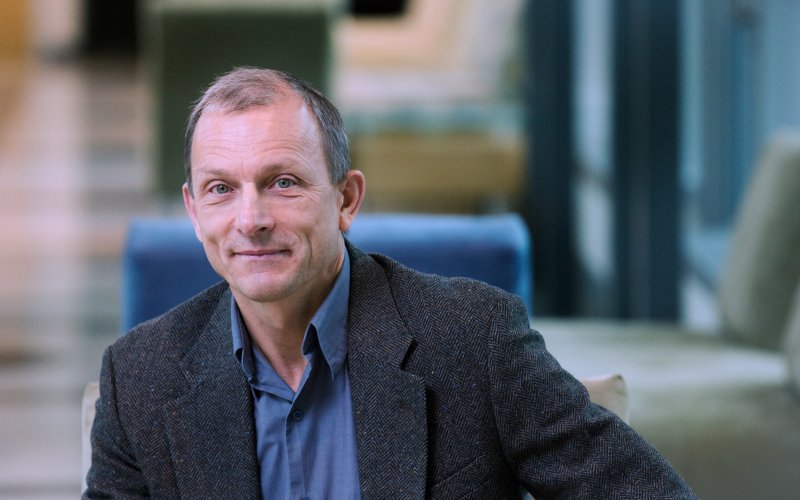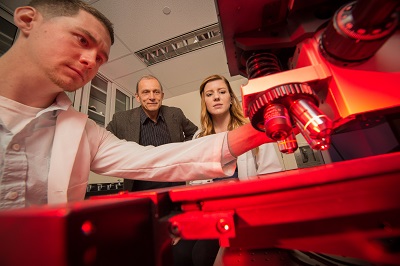Igor Lednev Named SUNY Distinguished Professor

ALBANY, N.Y. (Dec. 2, 2021) – Igor Lednev is the latest UAlbany faculty member to achieve SUNY’s most prestigious teaching honor.
Lednev, a professor in the Department of Chemistry, was elevated last month to Distinguished Professor, the highest academic rank in the State University of New York, conferred solely by the SUNY Board of Trustees.
The title is conferred upon SUNY faculty who have achieved national or international prominence and a distinguished reputation within their chosen field. It ranks above full professor and has three co-equal designations: distinguished professor, distinguished service professor and distinguished teaching professor.
“Professor Lednev epitomizes academic excellence, serving as a pioneer in forensic science research and innovation, along with being a valuable mentor and educator to his students,” said UAlbany Provost and Senior Vice President for Academic Affairs Carol Kim. “We are tremendously proud of his significant contributions as a global leader in his field and applaud his promotion to SUNY’s list of distinguished faculty.”
“Professor Lednev’s research and academic activity is exemplary,” added Alexander Shekhtman, chemistry professor and chair. “I have no doubt that now, as a distinguished professor, he will further elevate the standards of scholarship in our department and the University within and beyond his academic field of analytical chemistry.”
“Professor Lednev is deserving of SUNY’s highest faculty rank,” added Andrew Berglund, director of The RNA Institute. “He’s an innovative leader in forensic science and one of his many outstanding qualities is his mentoring of the next generation of researchers in the field.”
Laser-Based Tech

Lednev’s research is focused on the use of laser spectroscopy for forensic purposes, medical diagnostics and fundamental biochemistry. His accomplishments include the development of new and innovative approaches for the identification and characterization of biological stains, gunshot residue, hair and other trace evidence recovered at a crime scene, and a noninvasive, early diagnostics of neurodegenerative diseases such as Alzheimer’s and Parkinson’s.
The Lednev Lab developed the first universal method for the identification of body fluid traces, resulting in creating a new subfield of analytical vibrational spectroscopy of body fluids. Lednev is now collaborating with Ray Wickenheiser, director of the New York State Police Crime Lab System, along with a number of other practitioners in the field, to turn his novel technology into a useable product for law enforcement agencies and forensic crime labs. His startup company SupreMEtric LLC commercializes the technology.
Additionally, Lednev developed a noninvasive screening test for Alzheimer’s disease based on blood and saliva analysis. It is commercialized through the University spinoff Early Alzheimer’s Diagnostics LLC.
The National Institute of Justice (NIJ) has supported Lednev’s forensic science research for 13 consecutive years, investing over $3.2 million. His team has published over 60 articles in peer-reviewed journals on this topic and received three U.S. patents. In total, he has co-authored more than 250 publications in peer-reviewed journals, received eight U.S. patents and generated $6 million in federal funding for his research.
Lednev is a fellow of the Society for Applied Spectroscopy and the Royal Society of Chemistry and serves as the specialty chief editor of Frontiers in Analytical Science. He is also on the editorial boards of Raman Spectroscopy, Forensic Chemistry, Spectroscopy Magazine and High Energy Chemistry.
Together with the NIJ, he launched a new forensic science symposium at Pittcon (the world’s largest analytical chemistry conference) in 2018. The symposium has since become a regular annual event. He also previously served as an advisory member on the White House Subcommittee for Forensic Science and was recruited in 2020 by the United Nations to give a week-long training course at the National Crime Laboratory of Chile on the use of vibrational techniques to enhance forensic analysis.
Lednev is an adjunct professor in the Department of Biological Sciences and a faculty member of The RNA Institute.




